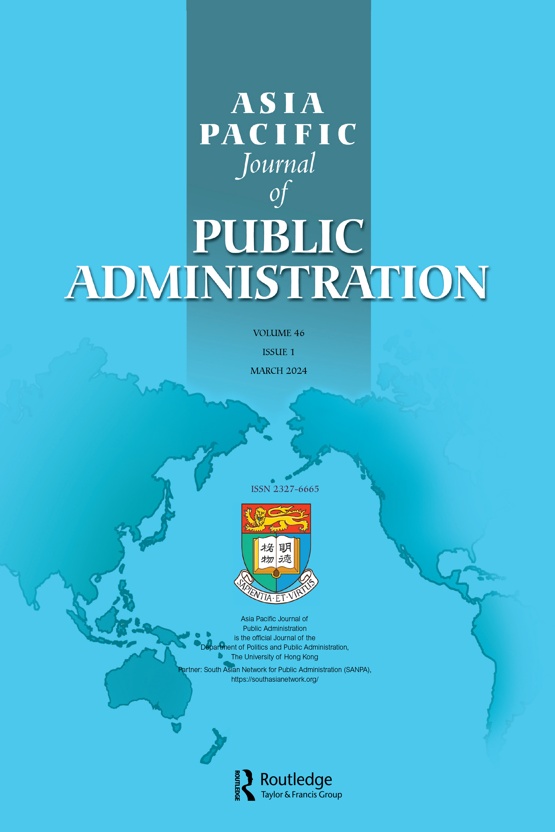Submit a Manuscript to the Journal
Asia Pacific Journal of Public Administration
For a Special Issue on
Building Global Public Administration Knowledge: Perspectives from the Global South Focusing on Faith, Culture, and Traditions
Abstract deadline
31 July 2024
Manuscript deadline
15 December 2024

Special Issue Editor(s)
Aisha Azhar,
School of Governance and Society, University of Management and Technology, Pakistan
[email protected]
Meghna Sabharwal,
The University of Texas at Dallas, USA
[email protected]
Mohammad Mizanur Rahman,
South Asian Network for Public Administration
[email protected]
Building Global Public Administration Knowledge: Perspectives from the Global South Focusing on Faith, Culture, and Traditions
When the new public management (NPM) discourse appeared as the pretext of liberalization and privatization following the economic meltdown in the 1970s, it was argued that NPM, accompanied by the structural adjustment program, would be a panacea for market openness and governance improvement in developing countries. The Western economic trinity, consisting of the World Bank, International Monetary Fund, and the US Treasury, played a pivotal role in the liberalization and privatization move under the direct political patronage of the Regan-Thatcher duo. Practitioners and scholars learned, however, that market and policy reforms could not be imposed, but they instead had to emerge from within the context of each country and society. In the intervening years, research contesting the top-down approach to reforms has surged. Nobel laureate in economics and the former World Bank Senior Vice-President and Chief Economist Joseph Stiglitz led the scholarly movement against Western policy hegemony.
The Industrial Revolution, being the watershed moment in modern development, triggered the shift in the global power structure, leading to colonization by Western powers/countries. Before colonization, societies and nations, particularly in today's Global South, were governed by their own customs, traditions, and codes rooted in their cultures and beliefs. However, these sources were either severely corrupted or squeezed with the advent of the colonial powers, resulting in the Global South's marginalization of knowledge and practices. Further, the post-WWII international context put Western nations in the driver’s seat to shape global institutions, policies, and practices.
There is a new awakening in Africa, Asia, and many other parts of the world to revive past practices and knowledge, draw strengths from indigenous sources, and make policies more endogenous. The Islamic Public Value project of the University College London is such an initiative. Today's public administration knowledge, predominantly influenced by Western norms and practices, can benefit from the knowledge and values of the Global South, contributing to developing a more balanced and fair approach to studying and researching the discipline. This revival can offer more ownership over reforms and policy agendas and attract citizens' greater buy-in.
Within this context, this special issue of the Asia Pacific Journal of Public Administration aims to explore and contribute to the evolving landscape of public administration by focusing on perspectives from the Global South. As the world grapples with complex issues ranging from sustainable development to effective governance, insights rooted in diverse cultural and philosophical traditions, particularly Islamic, Hinduism, and Confucian traditions (other traditions are also welcome), become imperative for holistic and contextually relevant solutions.
We invite original research papers, case studies, and theoretical contributions that shed light on various aspects of public administration within the context of the Global South, including but not limited to:
- Explore how religious and or cultural values and norms shape administrative practices, public service delivery, and governance structures. Examine theoretically and empirically, using historical institutionalism, the influence of colonialism on current administrative institutions and practices.
- Examine the notion of public value from the perspective of the Global South, considering unique beliefs and cultural, social, and economic contexts.
- Address the epistemological gaps between the Global South and North within the realm of public administration scholarship.
- Propose methodologies and frameworks for decolonizing research approaches, curricula, and institutional practices.
- Analyse governance challenges faced by countries in the Global South and explore innovative solutions that emerge from cultural and philosophical perspectives.
- Explore challenges and opportunities for promoting ethical conduct and accountability in public administration within culturally diverse societies.
This special issue is a unique opportunity for public administration scholars and practitioners from the Global South or dealing with agendas concerning the Global South to advance public administration scholarships and minimize the North-South divide.
Looking to Publish your Research?
Find out how to publish your research open access with Taylor & Francis Group.
Choose open accessSubmission Instructions
Submissions may range from 6,000 words to a maximum of 9,000 words and use APA style (7th Edition), which is the standard for the Asia Pacific Journal of Public Administration.
Feel free to send ideas, draft papers, or other materials to the special issue editors for review and comment.
Timeline:
- Proposals for papers should be submitted to the special issue editors no later than 31 July 2024.
- Scholars whose proposals are selected for review will be notified by 30 October 2024.
- Full papers should be submitted for review no later than 15 December 2024.
- The special issue is expected to be published in the first issue of 2026.